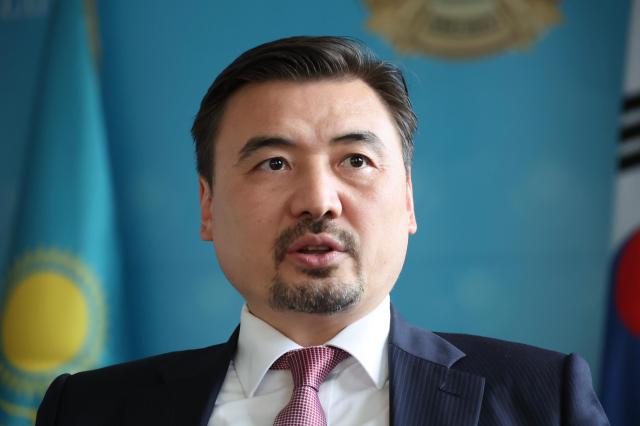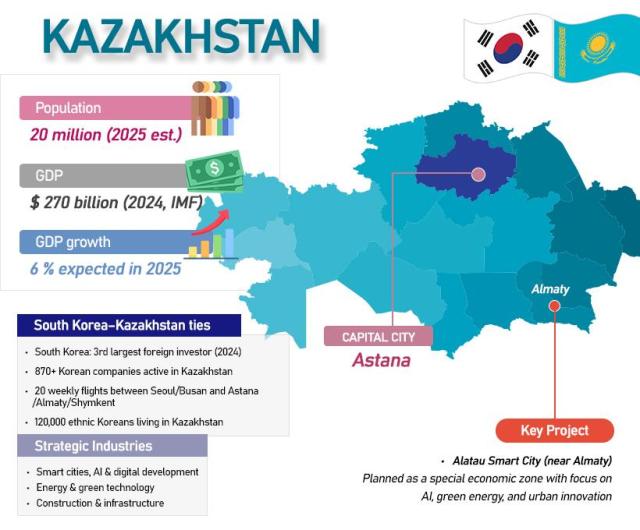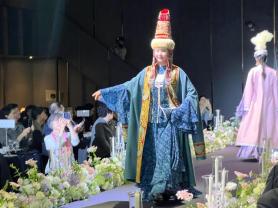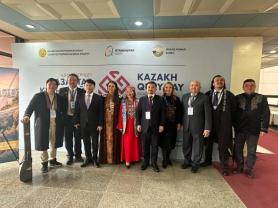
SEOUL, October 13 (AJP) - Kazakhstan, the Central Asian hub eager to break away from its raw materials-based economy, is turning to South Korea as a strategic partner in its ambitious push to become a global digital and artificial intelligence powerhouse.
A high-profile government delegation will visit Seoul this week to present Kazakhstan’s institutional and systemic transformation, highlighting the Alatau Smart City project as its flagship initiative.
“Kazakhstan has focused heavily on digital transformation,” said Nurgali Arystanov, Kazakhstan’s ambassador to South Korea, in an interview with AJP ahead of the Alatau Rise with Kazakhstan forum in Seoul on October 15–16. “Every ministry now has a department of information technology, and most administrative work is handled digitally. This shows how serious we are about building a digital society.”
The envoy pointed to the shared aspirations of Astana (formerly Nur-Sultan) and Seoul to become global digital leaders. He said Kazakhstan’s digital strategy aligns closely with South Korea’s national drive under President Lee Jae Myung to integrate AI into public services.
President Kassym-Jomart Tokayev announced last month an ambitious goal to transform Kazakhstan into a fully digital nation within three years by embedding AI across all sectors. His administration recently launched the Ministry of AI and Digital Development to spearhead the initiative.
“Both our countries are working toward the same goal — to make people’s lives better through technology,” Arystanov said.

Located 47 kilometers north of Almaty, the Alatau Smart City is designed as a next-generation urban model integrating artificial intelligence, the Internet of Things, green energy, water-saving systems, and urban air mobility, with plans for an international airport. The Kazakh government has looked to Shenzhen and other global innovation hubs for inspiration, seeking foreign investment through special legal status and generous tax incentives.
“Alatau City is not just a construction project,” Arystanov said. “It represents a new way of living — sustainable, smart, and connected. We see Korea as a natural partner because of its advanced technology and our long-standing trust.”
Kazakhstan sees Korea as an ideal partner for its digital transition, backed by a robust oil-based economy growing by five to six percent annually and a highly digital-literate workforce that makes up 60 percent of its 18 million people. South Korea is already Kazakhstan’s third-largest investor after Russia and the Netherlands, with some 876 Korean-capital companies operating in the country, according to the ambassador.
Tourism and people-to-people exchanges are also on the rise, with weekly flight connections between Seoul, Busan, Astana, Almaty, and Shymkent now averaging 20 services — a 20 percent increase from last year.
The Seoul forum aims to elevate bilateral economic ties to a new level. The delegation includes senior officials from Kazakhstan’s ministries of economy, land, transport, infrastructure, investment, and digital development, who plan to detail investment incentives, tax breaks, and supportive measures such as 30-day visa-free entry and English-language accessibility through the Astana International Financial Center’s common law framework.
Historic ties also reinforce the partnership. Kazakhstan is home to about 120,000 ethnic Koreans, a community that continues to serve as a bridge between the two nations. On September 23, the Kazakhstan-Korea Friendship Association was launched in Seoul under Kwak Young Kil, chairman of Aju Media Corporation, as a platform for cultural, tourism, sports, and business exchanges.
Academic and research cooperation is also expanding, with Kazakhstan’s education minister recently visiting Korean universities and encouraging Korean firms to consider establishing R&D centers in Kazakhstan.
Copyright ⓒ Aju Press All rights reserved.




